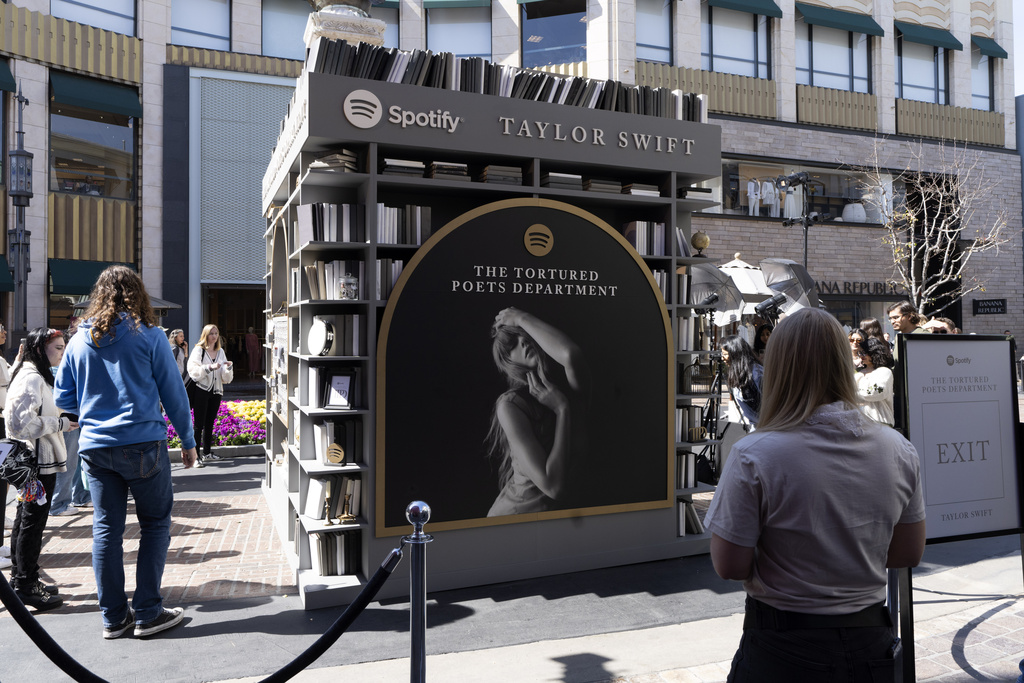MAYVILLE, N.Y. (AP) — The man accused in the stabbing attack on Salman Rushdie pleaded not guilty Saturday to attempted murder and assault charges in what a prosecutor called a “preplanned” crime, as the renowned author of “The Satanic Verses” remained hospitalized with serious injuries.
An attorney for Hadi Matar entered the plea on his behalf during an arraignment in western New York. The suspect appeared in court wearing a black and white jumpsuit and a white face mask, with his hands cuffed in front of him.
A judge ordered him held without bail after District Attorney Jason Schmidt told her Matar took steps to purposely put himself in position to harm Rushdie, getting an advance pass to the event where the author was speaking and arriving a day early bearing a fake ID.
“This was a targeted, unprovoked, preplanned attack on Mr. Rushdie,” Schmidt said.
Public defender Nathaniel Barone complained that authorities had taken too long to get Matar in front of a judge while leaving him “hooked up to a bench at the state police barracks.”
“He has that constitutional right of presumed innocence,” Barone added.
Matar, 24, is accused of attacking Rushdie on Friday as the author was being introduced at a lecture at the Chautauqua Institute, a nonprofit education and retreat center.
Rushdie, 75, suffered a damaged liver and severed nerves in an arm and an eye, and was on a ventilator and unable to speak, his agent Andrew Wylie said Friday evening. Rushdie was likely to lose the injured eye.
The attack was met with shock and outrage from much of the world, along with tributes and praise for the award-winning author who for more than 30 years has faced death threats for “The Satanic Verses.”
Authors, activists and government officials cited Rushdie’s courage for his longtime advocacy of free speech despite the risks to his own safety. Writer and longtime friend Ian McEwan called Rushdie “an inspirational defender of persecuted writers and journalists across the world,” and actor-author Kal Penn cited him as a role model “for an entire generation of artists, especially many of us in the South Asian diaspora toward whom he’s shown incredible warmth.”
President Joe Biden said Saturday in a statement that he and first lady Jill Biden were “shocked and saddened” by the attack.
“Salman Rushdie — with his insight into humanity, with his unmatched sense for story, with his refusal to be intimidated or silenced — stands for essential, universal ideals,” the statement read. “Truth. Courage. Resilience. The ability to share ideas without fear. These are the building blocks of any free and open society.”
Rushdie, a native of India who has since lived in Britain and the U.S., is known for his surreal and satirical prose style, beginning with his Booker Prize-winning 1981 novel “Midnight’s Children,” in which he sharply criticized India’s then-prime minister, Indira Gandhi.
“The Satanic Verses” drew death threats after it was published in 1988, with many Muslims regarding as blasphemy a dream sequence based on the life of the Prophet Muhammad, among other objections. Rushdie’s book had already been banned and burned in India, Pakistan and elsewhere before Iran’s Grand Ayatollah Ruhollah Khomeini issued a fatwa, or edict, calling for Rushdie’s death in 1989.
Khomeini died that same year, but the fatwa remains in effect. Iran’s current supreme leader, Khamenei, never issued a fatwa of his own withdrawing the edict, though Iran in recent years hasn’t focused on the writer.
Investigators were working to determine whether the assailant, born a decade after “The Satanic Verses” was published, acted alone.
District Attorney Schmidt alluded to the fatwa as a potential motive in arguing arguing against bail.
“Even if this court were to set a million dollars bail, we stand a risk that bail could be met,” Schmidt said.
“His resources don’t matter to me. We understand that the agenda that was carried out yesterday is something that was adopted and it’s sanctioned by larger groups and organizations well beyond the jurisdictional borders of Chautauqua County,” the prosecutor said.
Authorities said Matar is from Fairview, New Jersey. He was born in the United States to Lebanese parents who emigrated from Yaroun in southern Lebanon, the mayor of the village, Ali Tehfe, told The Associated Press.
Flags of Iran-backed Shia militant group Hezbollah and portraits of leader Hassan Nasrallah, Iran’s supreme leader Ayatollah Ali Khamenei, his late predecessor Ayatollah Ruhollah Khomeini, and slain Iranian Gen. Qassem Soleimani are visible across the village, which also has a small Christian population.
Journalists visiting the village Saturday were asked to leave. Hezbollah spokespeople did not respond to inquiries about Matar and the attack.
Iran’s theocratic government and its state-run media assigned no motive for the attack. In Tehran, some Iranians interviewed by the AP praised the attack on an author they believe tarnished the Islamic faith, while others worried it would further isolate their country.
An AP reporter witnessed the attacker stab or punch Rushdie about 10 or 15 times. Dr. Martin Haskell, a physician who was among those who rushed to help, described Rushdie’s wounds as “serious but recoverable.”
Event moderator Henry Reese, 73, suffered a facial injury and was treated and released from a hospital, police said. He and Rushdie had planned to discuss the United States as a refuge for writers and other artists in exile.
A state trooper and a county sheriff’s deputy were assigned to Rushdie’s lecture, and state police said the trooper made the arrest. But afterward some longtime visitors to the center questioned why there wasn’t tighter security given the threats against Rushdie and a bounty of more than $3 million on his head.
The stabbing reverberated from the tranquil town of Chautauqua to the United Nations, which issued a statement expressing Secretary-General Antonio Guterres’ horror and stressing that free expression and opinion should not be met with violence.
Iran’s mission to the United Nations did not immediately respond to a request for comment.
After the publication of “The Satanic Verses,” often-violent protests erupted across the Muslim world against Rushdie, who was born to a Muslim family and has long identified as a nonbeliever, once calling himself “a hardline atheist.”
At least 45 people were killed in riots over the book, including 12 people in Rushdie’s hometown of Mumbai. In 1991, a Japanese translator of the book was stabbed to death and an Italian translator survived a knife attack. In 1993, the book’s Norwegian publisher was shot three times and survived.
The death threats and bounty led Rushdie to go into hiding under a British government protection program, which included an around-the-clock armed guard. Rushdie emerged after nine years of seclusion and cautiously resumed more public appearances, maintaining his outspoken criticism of religious extremism overall.
In 2012, Rushdie published a memoir about the fatwa titled “Joseph Anton,” the pseudonym Rushdie used while in hiding. He said during a New York talk that year that terrorism was really the art of fear.
“The only way you can defeat it is by deciding not to be afraid,” he said.
The Chautauqua Institution, about 55 miles (89 kilometers) southwest of Buffalo in a rural corner of New York, has served for more than a century as a place for reflection and spiritual guidance. Visitors don’t pass through metal detectors or undergo bag checks, and most people leave the doors to their century-old cottages unlocked at night.
The center is known for its summertime lecture series, where Rushdie has spoken before.
At a Friday evening vigil, a few hundred residents and visitors gathered for prayer, music and a long moment of silence.
“Hate can’t win,” one man shouted.
© 2023 - 910 Media Group


